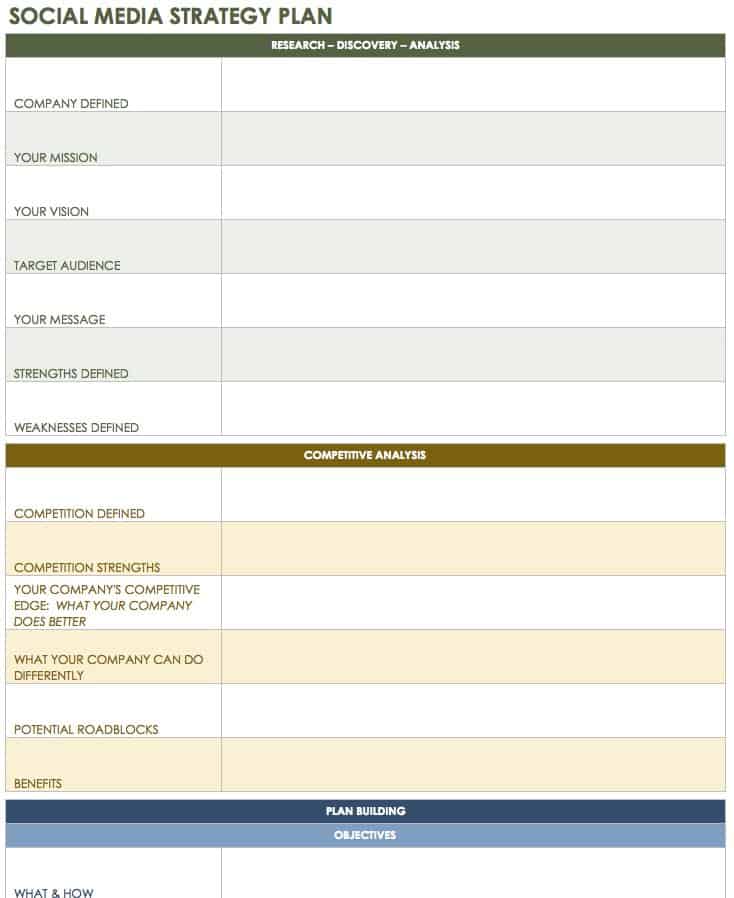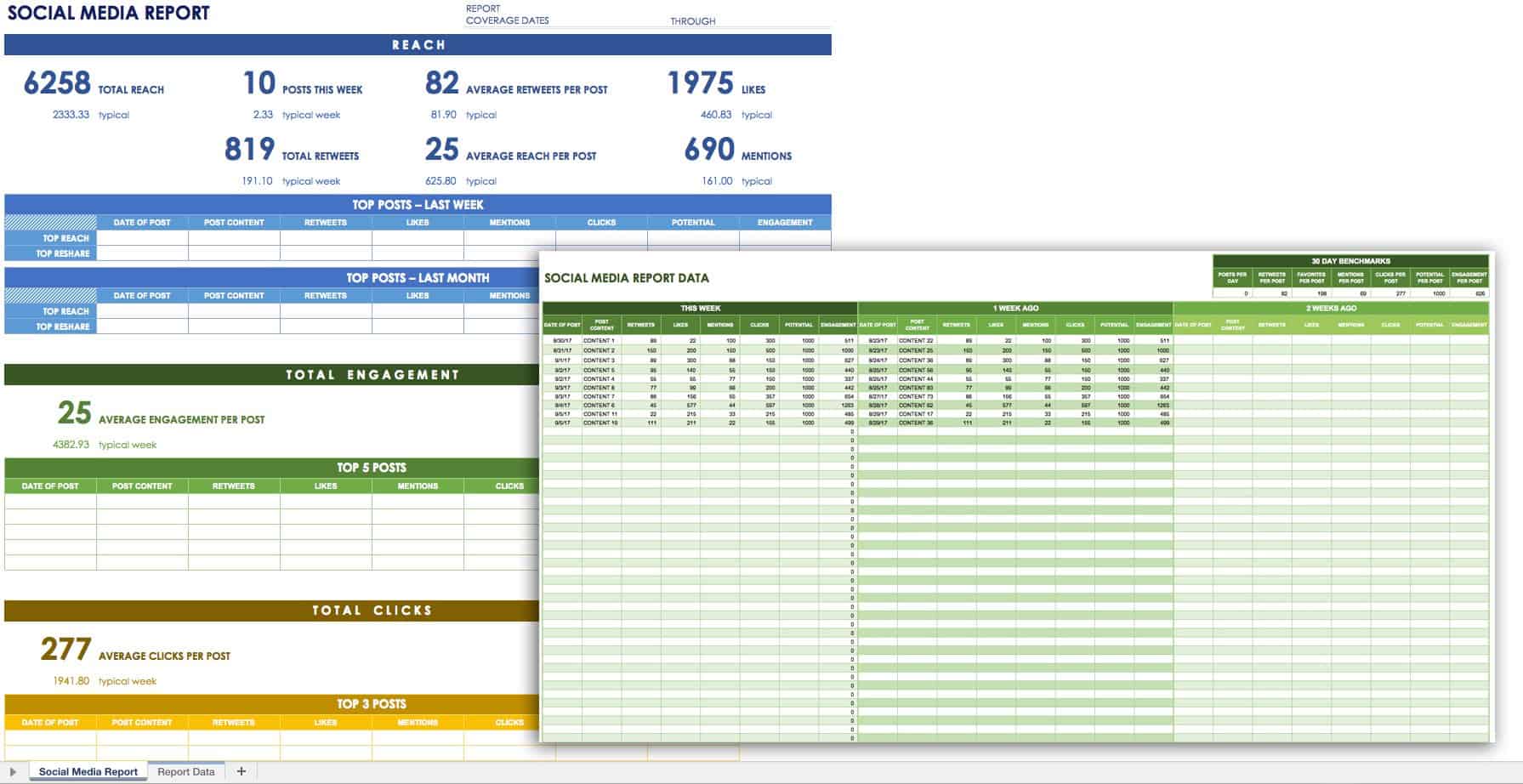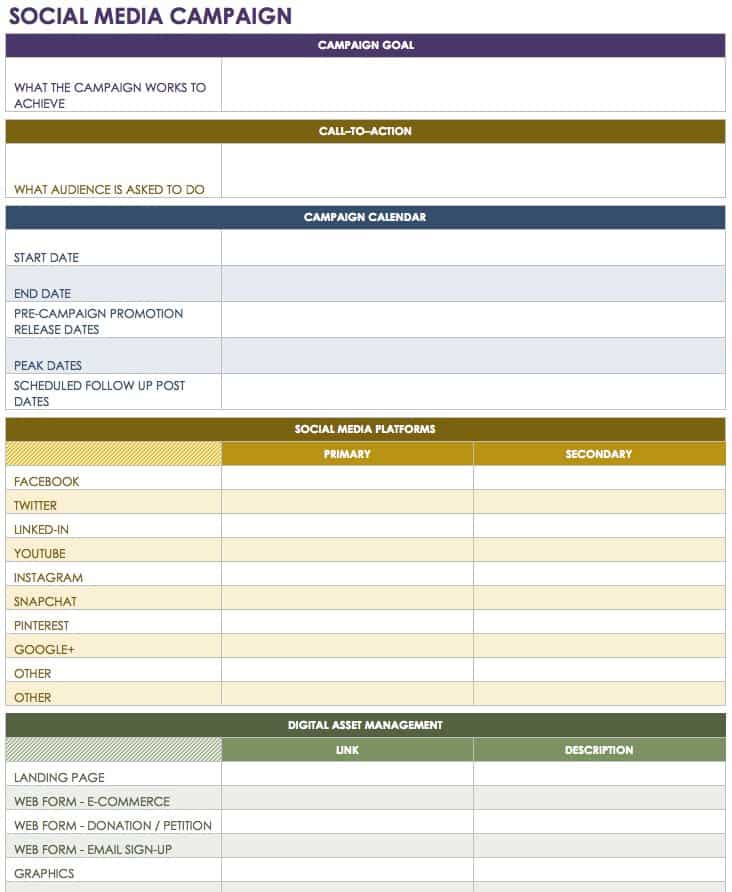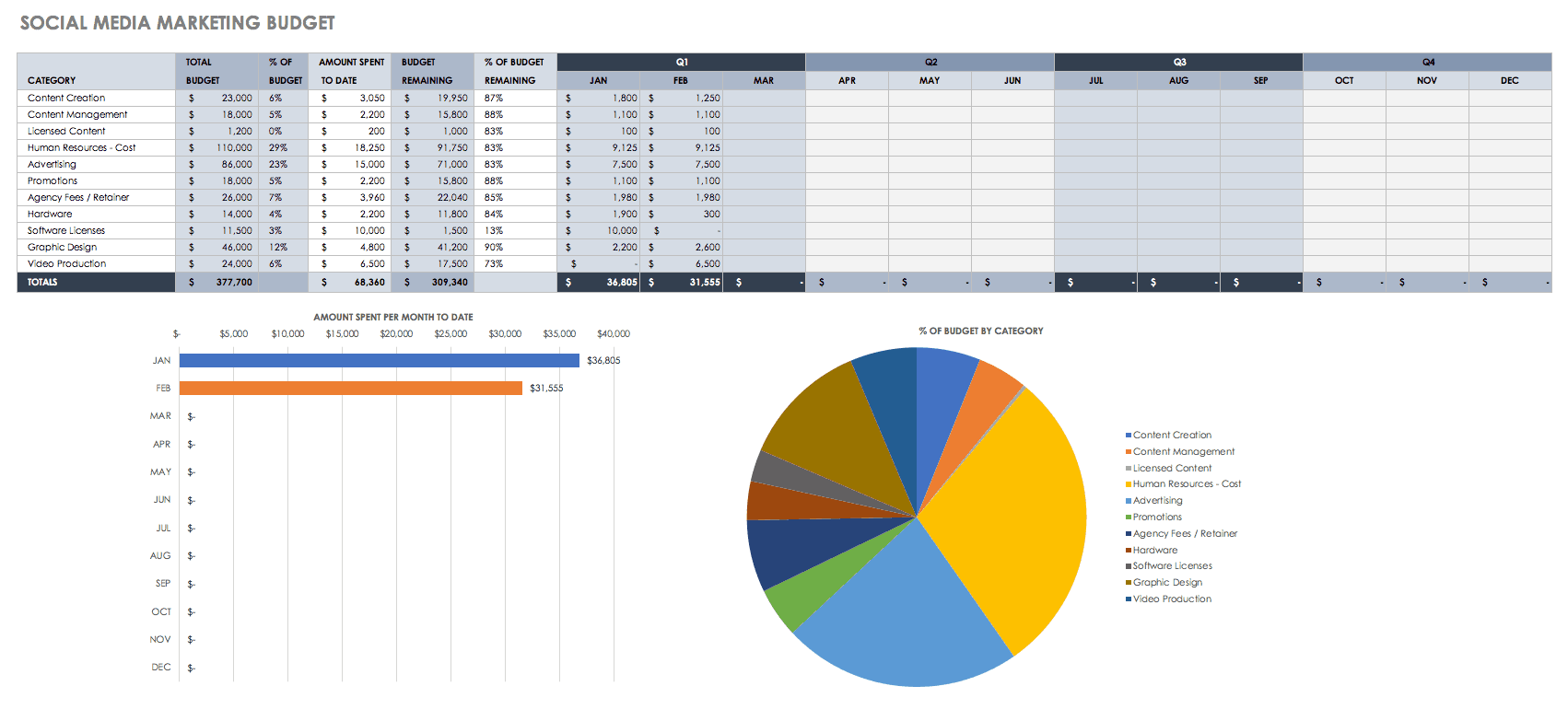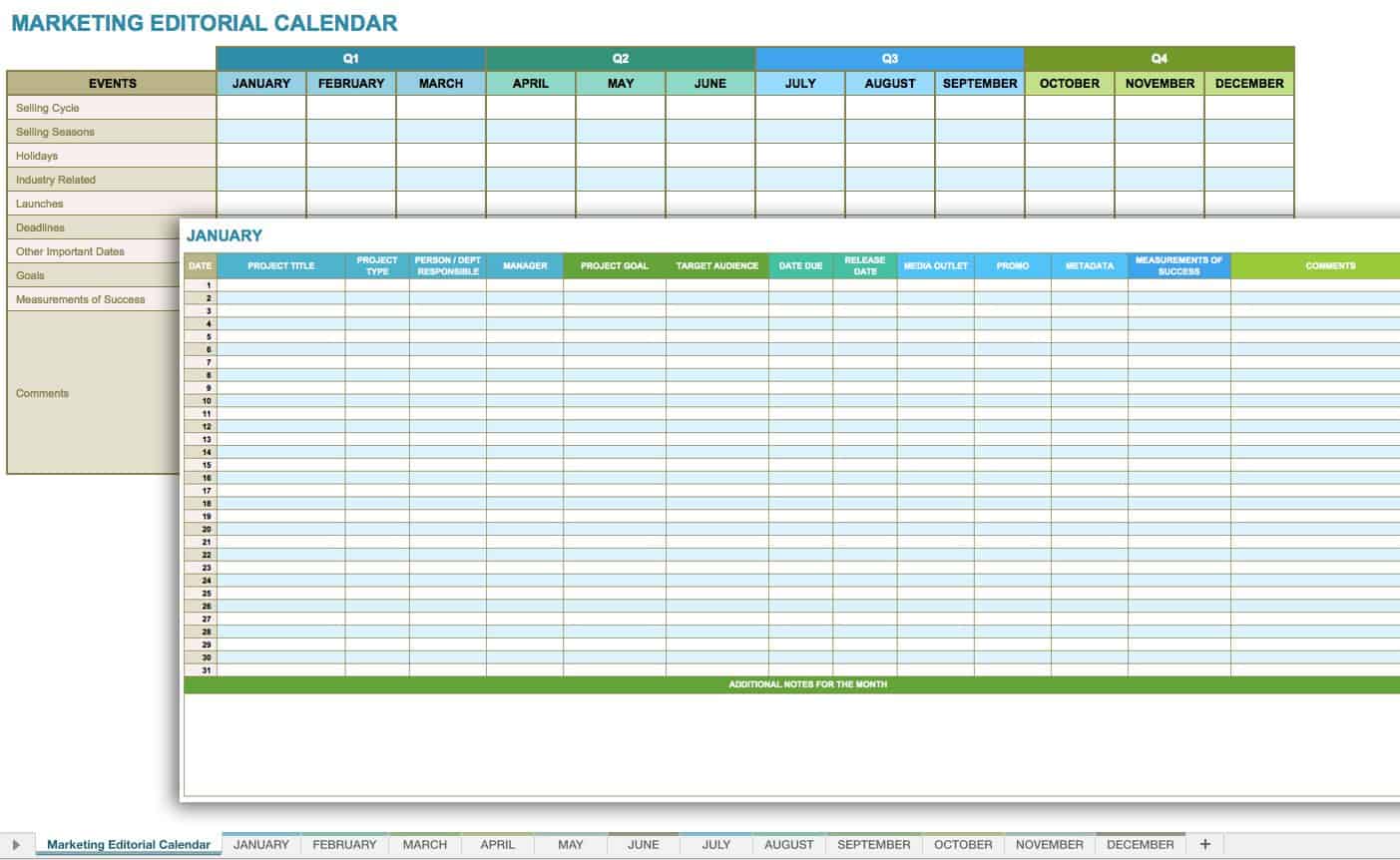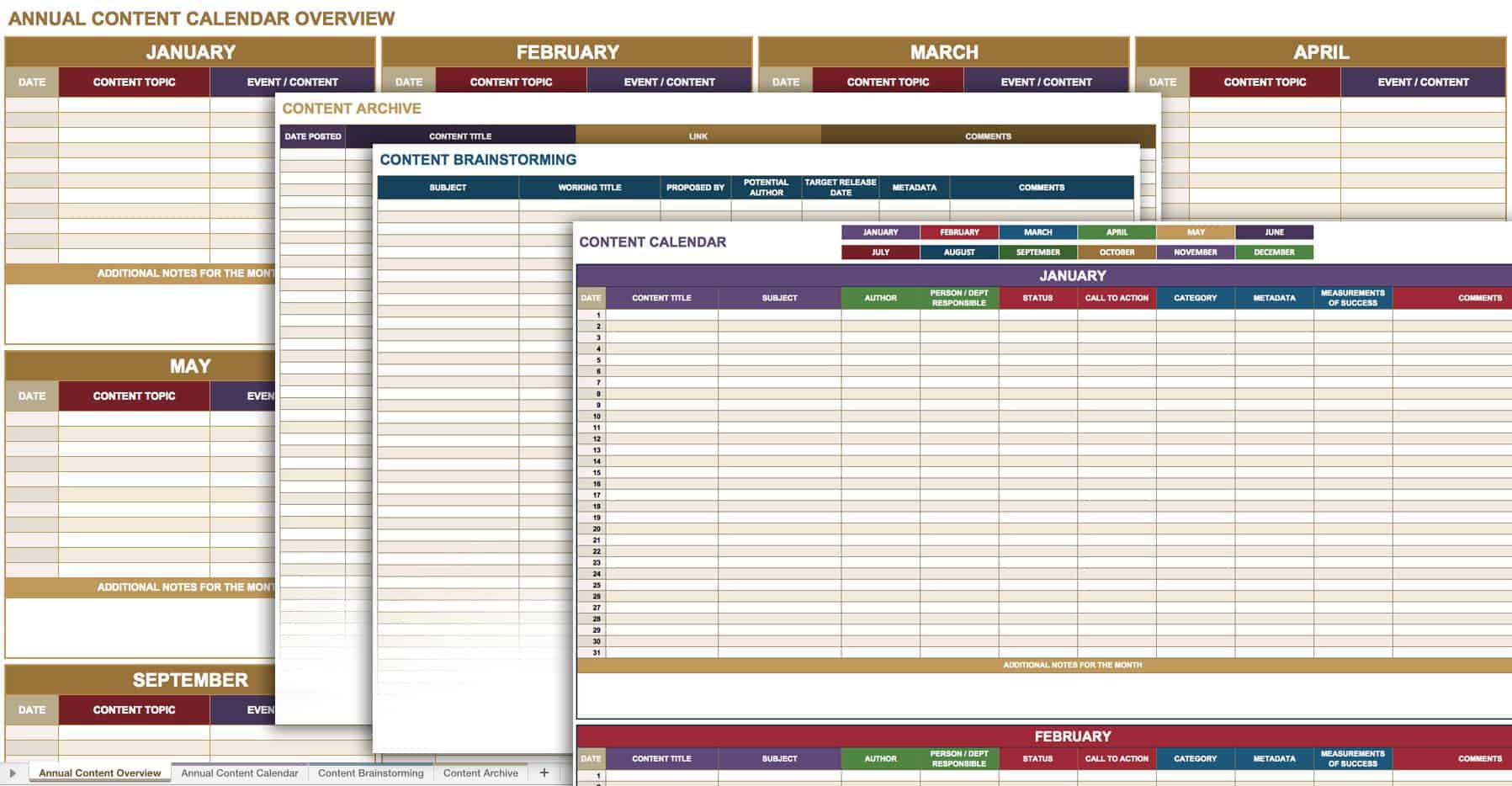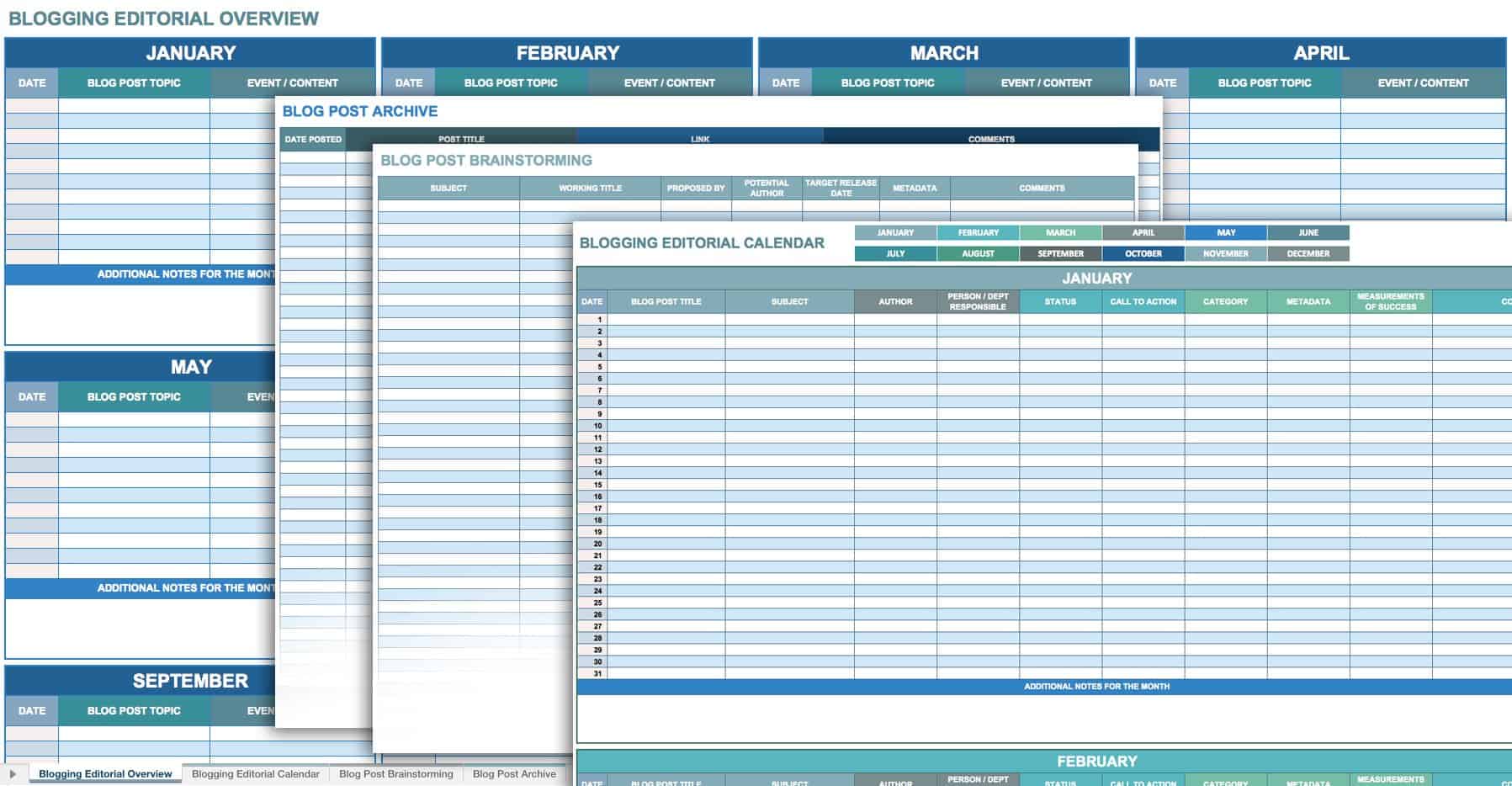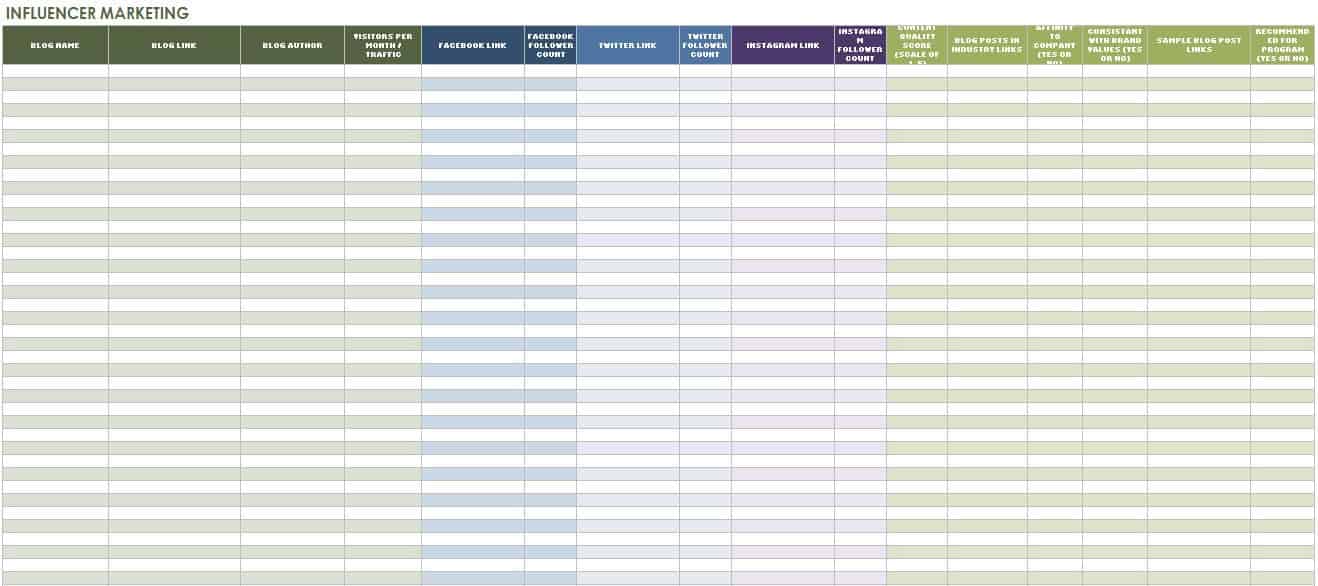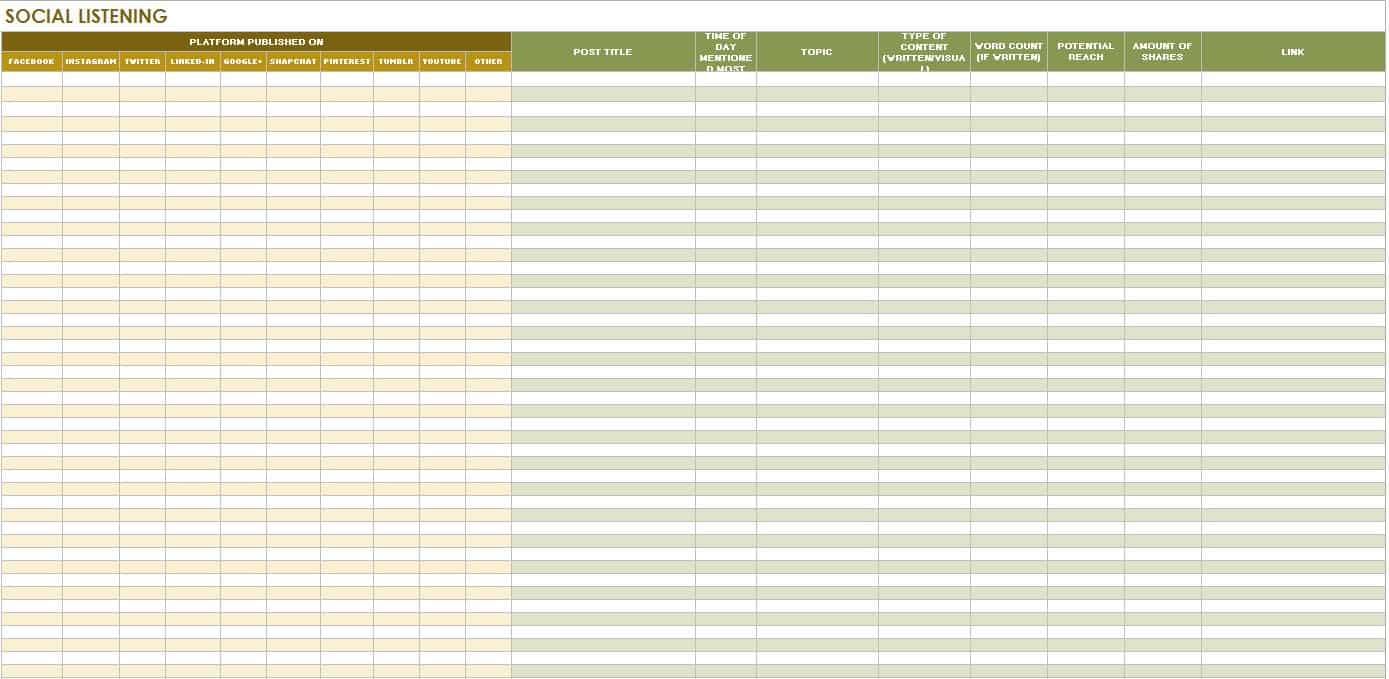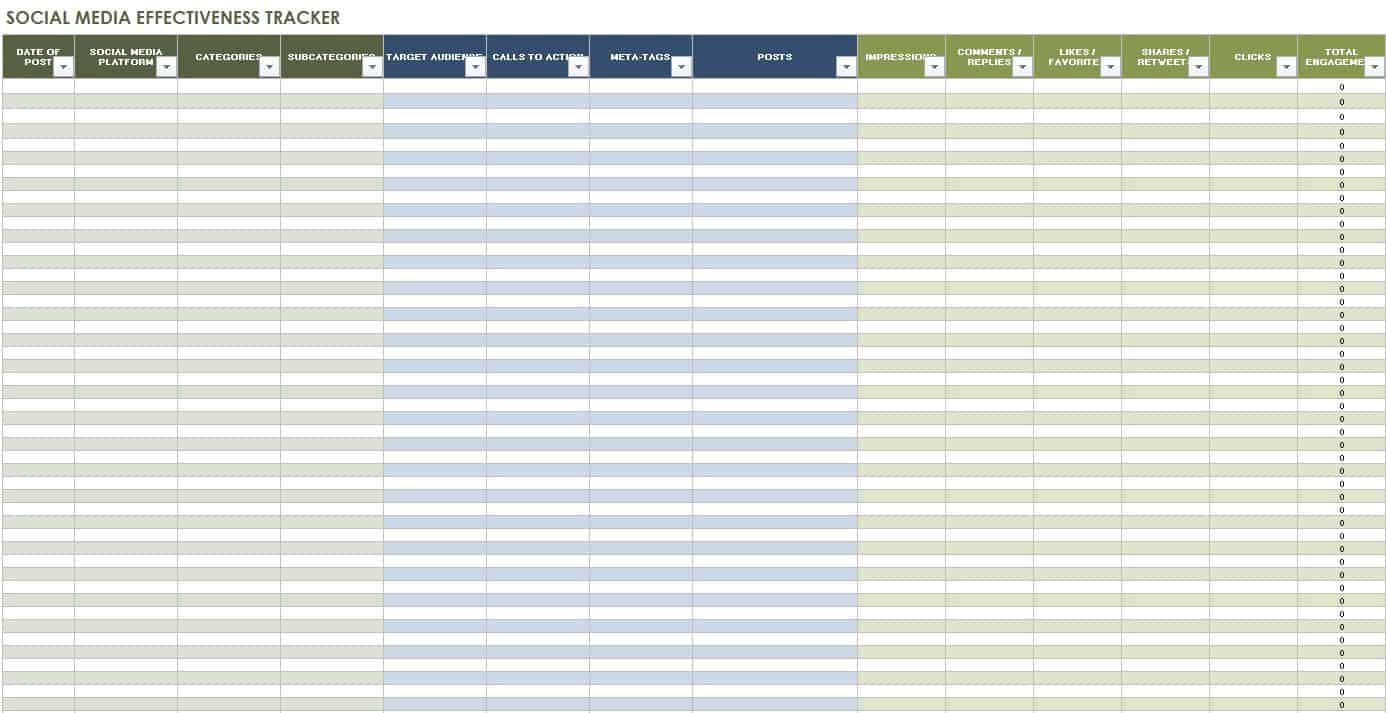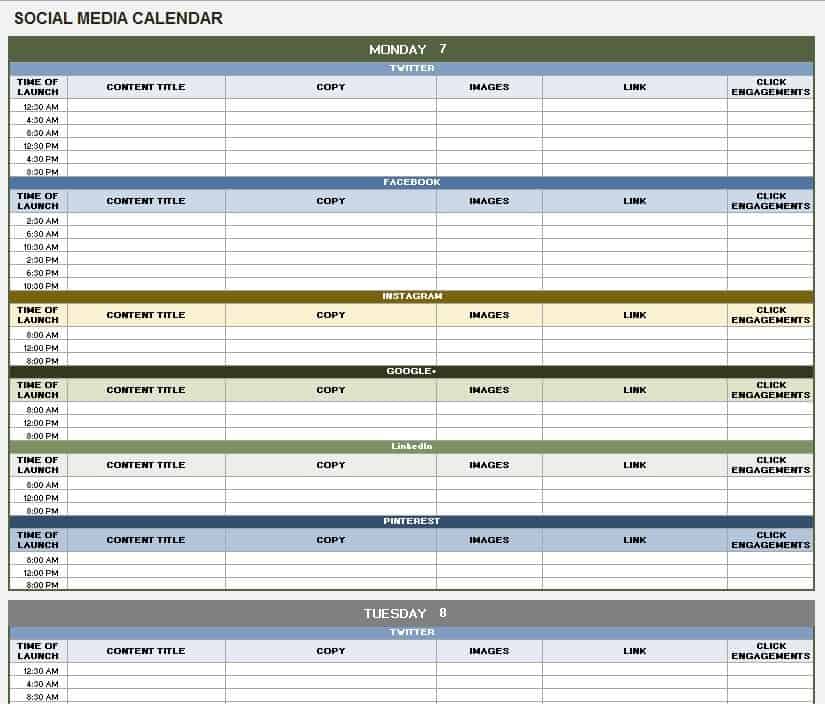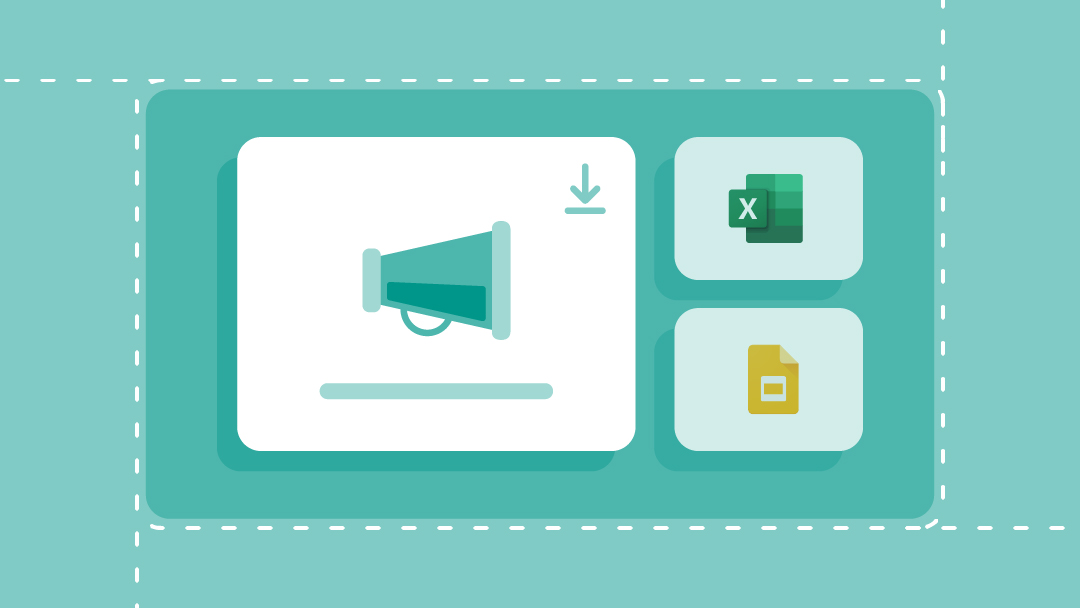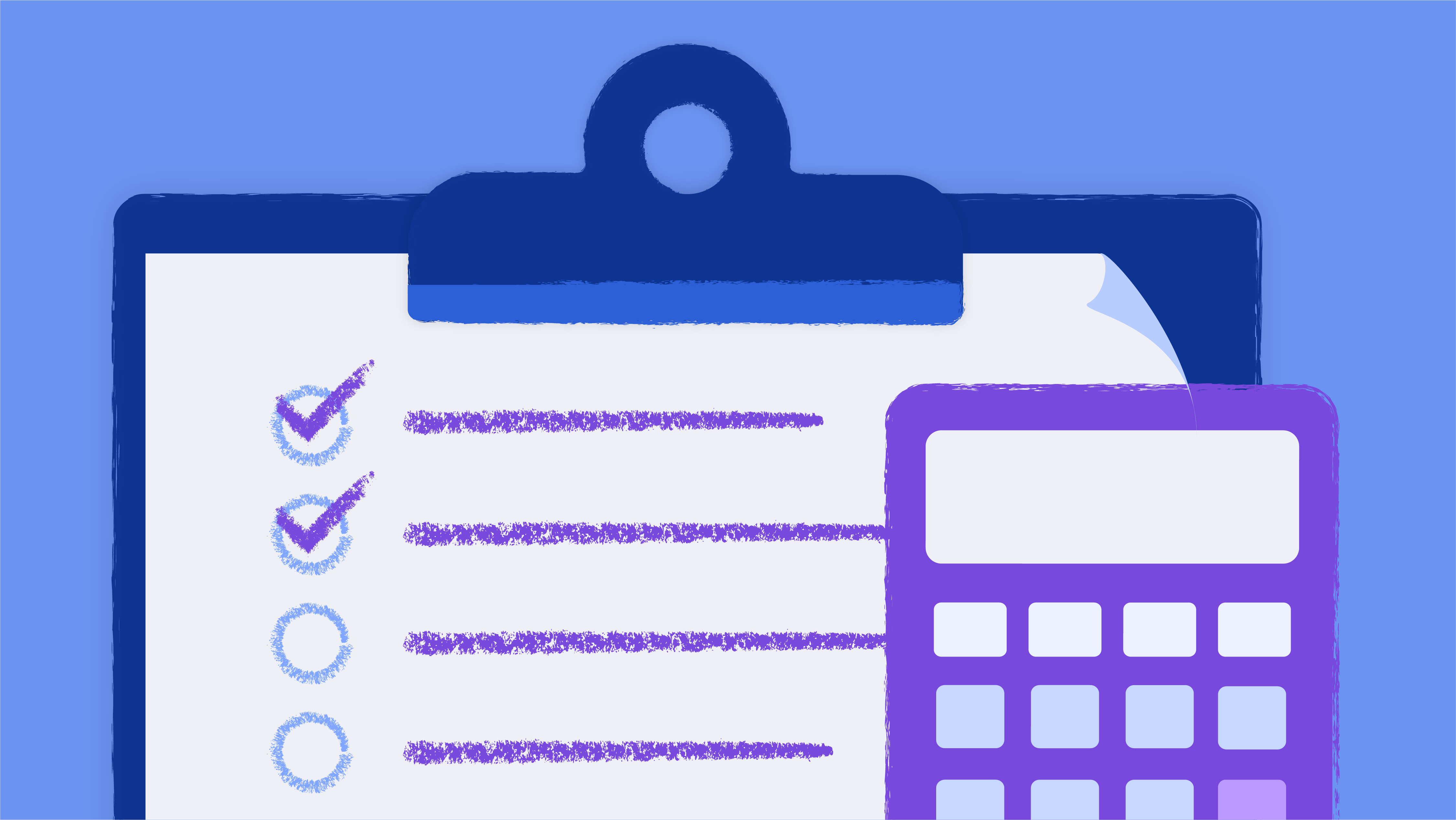Free Social Media Templates for Excel
Social Media Strategy Plan Template
Download Social Media Strategy Plan Template
This social media strategy template is designed to help you create a comprehensive strategy and action plan. Outline your company’s mission, target audience, messaging, obstacles, and goals. Research the competition and determine how to set yourself apart. Create a detailed plan for how to reach your objectives on each social network, and evaluate your success by measuring metrics.
Social Media Report Template
Download Social Media Report Template
Translate your KPIs into a social media report with visual metrics. Display information such as your number of posts, audience engagement per post, retweets, best performing posts, and more. Compiling and tracking these analytics in an easy-to-read report creates a great tool for communicating with your marketing team or managers.
Social Media Campaign Template
Download Social Media Campaign Template
Use this template to manage a particular social media campaign. The template includes sections for defining goals, the campaign timeline, the channels and types of content you will be focusing on, social media influencers and other outreach options, and metrics fmaor tracking performance. This is a detailed template that can easily be modified to suit your campaign needs.
Social Media Audit Template
Download Social Media Audit Template
A social media audit can inform your strategy and help ensure that your objectives are being met. Reviewing your monthly metrics and comparing them to the previous month and year can offer a clear picture of what parts of your social media plan are working and what needs to change. This audit template is a simple spreadsheet that can be edited to include all of your social channels and any metrics that you want to track.
Social Media Marketing Budget Template
Download Social Media Marketing Budget Template
Use this template to plan and track your social marketing budget with a spreadsheet view as well as visual metrics. The template includes monthly and annual totals, and provides a quick snapshot of how your budget is being allocated. Depending on the size of your business and scope of your social media plan, your budget may include personnel or agency expenses, content creation costs, paid promotions and more.
Editorial Calendar Template
Download Editorial Calendar Template
This editorial calendar template provides monthly, quarterly, and annual views, so you can create a long-term social media plan as well as detailed monthly schedules. Plan your calendar around important events, launches, and holidays. On each monthly calendar spreadsheet, you can assign projects, schedule deadlines, include target audience info, list SEO data, and track metrics.
Annual Content Calendar Template
Download Annual Content Calendar Template
Combine your annual content plan and calendar in one template. This template also includes sections for compiling content ideas and collecting your previous posts that were successful. You can use this template to create an annual overview of your marketing campaigns so that your social media plan is integrated with other marketing efforts.
Blogging Calendar Template
Download Blogging Calendar Template
Similar to the annual content calendar above, this blogging template is useful for planning, tracking, and brainstorming. It includes a yearly overview, detailed monthly schedules, a blog post archive, and a section for collecting ideas. Use this template when you need a dedicated calendar that focuses on blog planning, or modify it to include other social media plans.
Influencer Marketing Template
Download Influencer Marketing Template
Identify and track key influencers so that you can develop relationships with them. Influencer tracking can help you extend your reach to broader audiences by, for instance, working with a blogger who has a large, loyal following. This template can help you vet potential influencers to make sure they’re a good fit for your brand and objectives. Maintaining a list can also provide future outreach options - but you should build relationships with influencers before you actually engage them for a specific marketing campaign.
Social Listening Template
Download Social Listening Template
Use this template to document the results of analyzing any content or engagement related to your business or topics. By listening in on the activity on your social networks, you can learn more about your target audience - the type of content they are sharing, what content generates the most engagement, when posts are being shared, etc. - and who your influencers or competitors might be.
Social Media Effectiveness Tracker
Download Social Media Effectiveness Tracker
This template is designed to help you analyze your social media posts for a deeper understanding of what is working and why. Once you have all your data entered - and some social networks offer export features to speed up this process - filter the spreadsheet columns to analyze your posts based on different metrics. Getting a better sense of why certain posts are more successful can help you tailor your content for different social media platforms.
Planning a Social Media Content Calendar
Social Media Calendar Template
Download Social Media Calendar Template
Plan your daily social media calendar for all networks, with posting times scheduled throughout the day. The simple layout of this template makes it easy to see the daily schedule at a glance, but it also includes details such as headlines, content type, links and audience engagement. Update the schedule with any on-the-fly content that you add during the day to create an accurate record of your posts.
Translate your strategy into a scheduled plan using an editorial calendar. This may include your goals for various channels, how often you will be posting and at what times, the type of content to be shared, messaging, and metrics. Planning ahead will help organize your promotional schedule across multiple networks. Tracking audience engagement will give you an idea of the best days and times to post for your particular audience. While having a calendar will provide structure and deadlines, you also want to post spontaneously when it’s warranted, such as a relevant, breaking news story or commentary on a retweet. You can also use your calendar to archive your most successful content, and then reuse it later if it’s evergreen.
Here are some tips for planning content on specific social media networks:
- Twitter - Use Twitter for offering business tips and establishing yourself as an expert. Since Twitter limits posts to 140 characters, it’s perfect for cycling (and recycling) brief news updates throughout the day. But you’re not limited to text - try tweeting images to grab attention, and encourage retweets. Aim for several tweets per day, and afternoon work breaks or early evening commute times may reach more Twitter users.
- Facebook - Keep your Facebook posts brief and entertaining to encourage sharing and audience engagement. Use images and videos to capture attention and give personality to your online presence. Facebook is great for reaching a wide audience, but the focus tends to be more community oriented and less about business insights. It’s generally recommended to post on Facebook once per day, a few days per week.
- LinkedIn - Use LinkedIn to share industry news and build professional relationships. Sharing articles that are actually helpful and not just promotional matters here, but it’s still important to include images and videos in your content. Since LinkedIn is geared toward professionals, posting on weekday mornings or evenings may garner better results.
- Pinterest - Visuals are key on Pinterest. The majority of Pinterest users are women, and content is often DIY oriented. If this isn’t your audience, or your business messaging doesn’t translate well into strong visual content, Pinterest may not be the best choice. Top posting times will typically be on weekends.
- Google+ - In your public circle on Google+ you can share business info similar to what you would share on LinkedIn- think instructional videos and informative blog posts. Aim to post once per day, a few days per week, mid-morning to early afternoon on weekdays.
- Instagram - Another network for sharing visual content, Instagram is primarily used as a mobile app, so users may be accessing it many different times throughout the day, but early mornings may be best for reaching a wide audience. Consider ways to maximize your visual marketing, such as offering a giveaway that encourages followers to repost your content.
Once you’ve determined your posting schedule on all networks, be consistent and track analytics until you know the best times for reaching your target audience.
Creating Your Social Media Strategy
Before diving into the complex world of social media, you need a solid strategy to make sure your time is well spent and your social presence is effective. Creating a social media strategy will set you up for a clear action plan with objectives that are in alignment with your business goals. Determining measurable goals allows you to define clear tactics for your social media plan and to track progress by evaluating metrics.
As with any marketing plan, you need to identify your target audience, which can include existing and potential customers. Knowing your audience will help you determine what social media channels and types of content are most appropriate for your business. You can also get a sense of your audience by evaluating which of your social profiles are receiving the most traffic. If your audience has various subsets, depending on the business, products, or services you are promoting, it might also be beneficial to have multiple profiles on some social networks. Check the guidelines of different networks to find out their limits or requirements.
Analyzing your competitors’ social media presence can also inform your strategy. Research how many followers your competitors have on various networks to get an idea of where your target audience might be most active. You can also see what responses competitors are getting for different types of content to learn which tactics might be most successful.
Now that you’ve got your audience and social networks figured out, what are you going to share? You’ll need to determine your key messaging that both fits with your brand and distinguishes you from competitors. Keep this messaging in mind as you create social media profiles that reflect your brand, and make sure your profile images are sized appropriately for each network. Profile images offer customers a first impression of your business and should be consistent with your brand. Once you’re clear on brand messaging, you can narrow your focus to planning specific content. This may include campaigns around product launches or events, but nobody wants to be overwhelmed with promotional content - so make sure you are offering your audience real value and that you have a balance between promotional and other content. You also want a variety of content, including images and video, and to post regularly. The key word in social media is “social,” so create an engaging presence by encouraging conversation, replying to comments, and providing quality customer service.
If all this sounds like a lot of work, remember that you don’t have to create all original content. You can use curated content by watching for and sharing content that fits with your messaging and topics. Keep a log of curated content so that you have inspiration to choose from. You can also share the same content on different networks, but avoid too much redundancy by modifying the content slightly. Remember that you want to offer a variety of content, both in format and messaging. Different posts will have different goals, whether it’s to generate sales leads or direct traffic to your blog. Creating a publishing schedule will help ensure that you have a balanced mix of content across networks.
Build a Social Media Calendar in Smartsheet
Improve Social Media Campaign Visibility with Smartsheet for Marketing
The best marketing teams know the importance of effective campaign management, consistent creative operations, and powerful event logistics -- and Smartsheet helps you deliver on all three so you can be more effective and achieve more.
The Smartsheet platform makes it easy to plan, capture, manage, and report on work from anywhere, helping your team be more effective and get more done. Report on key metrics and get real-time visibility into work as it happens with roll-up reports, dashboards, and automated workflows built to keep your team connected and informed.
When teams have clarity into the work getting done, there’s no telling how much more they can accomplish in the same amount of time. Try Smartsheet for free, today.
Frequently Asked Questions
What Are Content Calendars?
Content calendars are strategic resources used by marketing teams to plan, track, and share content marketing activity. The calendar format gives a visual look at content and campaign launch dates.
As compared to a simple list of content, a calendar view offers better visibility into the specific pieces of content, when they are published, and who is responsible for what pieces of content.
What Is Evergreen Content?
Evergreen content is a type of content that is always considered relevant, never becomes dated, and reports on topics that are of importance to an audience.
Named after the evergreen tree, which retains its green leaves all year long, evergreen content never loses its significance.
